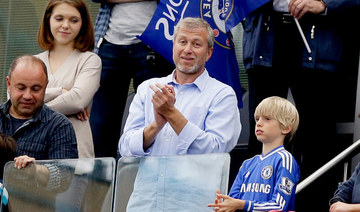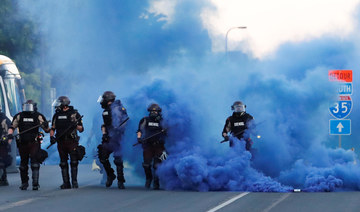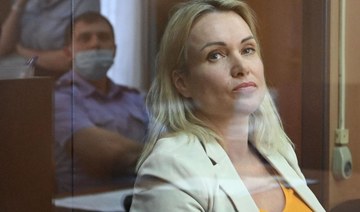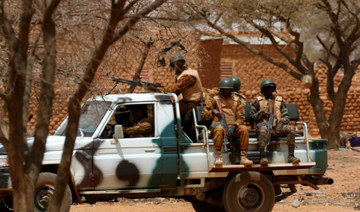LONDON: Reuters News has named one of its top editors, Alessandra Galloni, as its next editor-in-chief, the first woman to lead the globe-spanning news agency in its 170-year history.
A native of Rome, Galloni, 47, will replace Stephen J. Adler, who is retiring this month after leading the newsroom for the past decade. Under his leadership, Reuters has received hundreds of journalism awards, including seven Pulitzer Prizes, the industry’s highest honor.
A speaker of four languages, and with broad experience covering business and political news at Reuters and previously at the Wall Street Journal, Galloni takes the helm as the news agency faces an array of challenges. Some of these are common to all news media. Others are specific to the organization’s complexity: With a worldwide staff of some 2,450 journalists, Reuters serves a range of divergent customers and is also a unit in a much larger information-services business.
Since 2008, Reuters has been part of Thomson Reuters Corp. , a corporation with more-lucrative and faster-growing segments than news. Its chief executive, Steve Hasker, who joined Thomson Reuters last year, has focused on aggressively expanding the corporation’s three largest businesses: providing information, software and services to lawyers, corporations and the tax and accounting profession. Hasker’s strategy has helped boost Thomson Reuters stock to all-time highs.
Reuters News comprises about 10% of Thomson Reuters’ total $5.9 billion in revenues. Unlike many news organizations, Reuters is profitable. But it is also a drag on the parent company’s revenue growth and profit margin, analysts say, and the executive who runs the news business, Reuters President Michael Friedenberg, is pushing to increase sales and boost profitability. Looking forward, Thomson Reuters’ chief financial officer last month forecast that sales at its “Big Three” businesses are expected to grow 6% to 7% in 2023, while its news division and printing business “are expected to dilute organic revenue growth by about 1% to 2%.”
Gary Bisbee, an analyst at Bank of America, said he expects Reuters News “will continue to be a drag on the growth of the company,” but added that as other divisions of Thomson Reuters grow faster, that drag would diminish over time.
Thomson Reuters is hoping for a turn-around in the Reuters Events business, which it acquired in October 2019. Almost all in-person conferences last year were canceled or postponed because of the COVID-19 pandemic. But the business has pivoted to a hybrid events strategy for 2021 with both in-person and virtual conferences, and expects its revenues to improve.
While some in the industry have speculated that Thomson Reuters might want to sell the news division, three analysts said they don’t expect a sale. Douglas McCabe, a media analyst with Enders Analysis in London, said Reuters is “a tremendously powerful part of” the Thomson Reuters brand, and that “the mighty Reuters newsroom behind you and all the really specialized business assets is a great combination.”
In a statement, CEO Hasker said: “Thomson Reuters is committed to the future of Reuters News. It is an important part of the company and is valued across our customer base. The last year has proven beyond question the value of independent, global, unbiased journalism.”
This year saw the closing of a deal in which the former Financial and Risk business of Thomson Reuters — now called Refinitiv — was sold to the London Stock Exchange Group Plc in a $27 billion all-stock deal. Under the terms, Reuters News is guaranteed annual payments of at least $336 million to provide news and editorial content to Refinitiv until 2048. That stream of revenue is envied by many in the media industry.
Galloni has told colleagues that one of her critical tasks would be maintaining a good relationship with Refinitiv, as it is Reuters’ biggest customer, accounting for slightly more than half of the news agency’s $628 million in revenues last year.
The important relationship has been a source of some tension, senior editors say. As part of the contract with Refinitiv, Reuters is required to meet strict performance targets for the news coverage that Refinitiv clients receive, which Reuters has exceeded so far. Thomson Reuters, for its part, noted in its latest annual report that the exclusive deal, while lucrative, limits Reuters’ ability to sell to other customers in the growing financial-services industry. A Refinitiv spokesman declined to comment.
Gordon Crovitz, a former publisher of the Wall Street Journal, said the new editor will nevertheless have to find new sources of revenue. “Reuters is in an unusual position because the pledge from Refinitiv frees Reuters News up to be more aggressive in creating new news products to serve new markets,” he said. “I think there’s still a lot of low-hanging fruit for Reuters because of the strength of the brand and the size of the staff.”
New website
Reuters’ primary competitors include Bloomberg News, the Associated Press, French news agency AFP and visual content provider Getty Images. In addition to its events business, Reuters has been seeking other growth opportunities. Prominent among these is the upcoming launch of a revamped website that is expected to target professionals and eventually begin charging for content.
McCabe said convincing consumers to pay for content is challenging because “Reuters is a brand that a lot of people recognize but don’t intuitively go to.” But he is more optimistic that targeting professionals could succeed for Reuters. “All the evidence says to me that these are the subscription models that really work,” he said.
CEO Hasker has told colleagues that he wants to make Reuters more integral to the company’s other divisions. To that end, the newsroom recently added to its legal reporting staff.
Adler spearheaded a number of moves to modernize Reuters, which gained fame in its early days for using carrier pigeons to relay scoops. In the past decade, the newsroom created teams of investigative, data and graphics journalists, and is using artificial intelligence to speed the delivery of certain breaking financial news.
Hasker has said he is eager to continue modernizing the newsroom by getting it to embrace new technologies more aggressively. He and Friedenberg considered a wide range of journalists to succeed Adler, both inside and outside the news agency, according to people familiar with the matter.
Among them were two top Reuters editors, Gina Chua and Simon Robinson. The external candidates included David Walmsley, editor in chief of Canada’s The Globe and Mail, and Kevin Delaney, former co-chief executive and editor-in-chief of Quartz Media Inc.
Galloni, based in London, is known internally as a charismatic presence with a keen interest in business news. She has told colleagues that her priorities would include boosting the Reuters digital and events businesses.
She takes the helm after serving as a global managing editor of Reuters, overseeing journalists in 200 locations around the world. At the beginning of her career, she worked at the Reuters Italian-language news service. She received degrees from Harvard University and the London School of Economics. She returned to Reuters in 2013 following about 13 years at The Wall Street Journal, where she specialized in economics and business coverage as a reporter and editor in London, Paris and Rome.
“For 170 years, Reuters has set the standard for independent, trusted and global reporting,” Galloni said in the Reuters announcement on her appointment, which takes effect on April 19. “It is an honor to lead a world-class newsroom full of talented, dedicated and inspiring journalists.”
The hunt for the new Reuters editor came as other major media are dealing with succession in the newsroom. Both the Washington Post, where executive editor Marty Baron retired in February, and the Los Angeles Times, where Norman Pearlstine stepped down as executive editor in December, are currently seeking their replacements.
Reuters names Alessandra Galloni as its next editor-in-chief
https://arab.news/2y7y6
Reuters names Alessandra Galloni as its next editor-in-chief
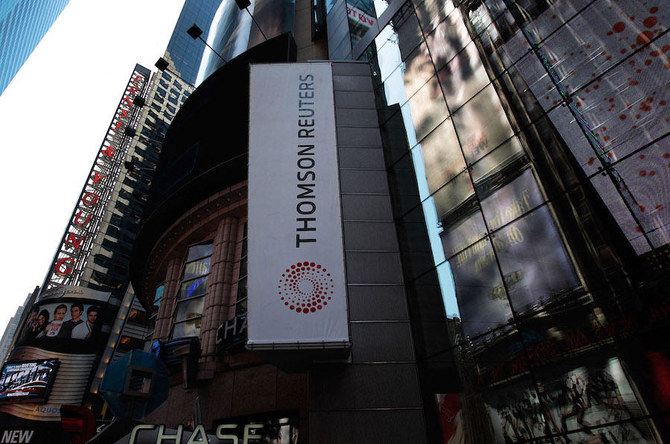
- A native of Rome, Galloni, 47, will replace Stephen J. Adler, who is retiring this month after leading the newsroom for the past decade
Two Russian journalists jailed on ‘extremism’ charges for alleged work for Navalny group
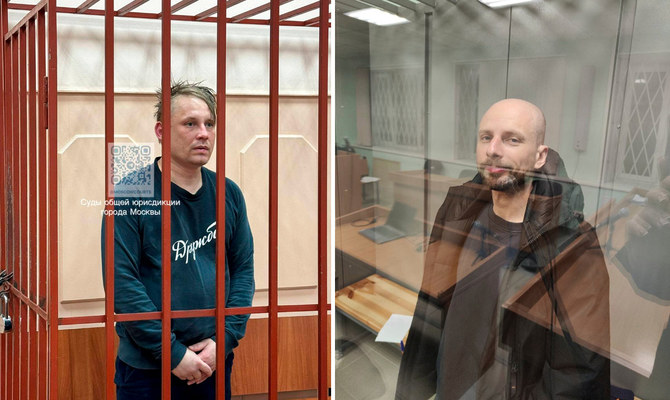
- Konstantin Gabov and Sergey Karelin both denied the charges for which they will be detained for a minimum of two months before any trials begin
- Russia’s crackdown is aimed at opposition figures, journalists, activists, members of the LGBTQ+ community, and other dissenters
LONDON: Two Russian journalists were arrested by their government on “extremism” charges and ordered by courts there on Saturday to remain in custody pending investigation and trial on accusations of working for a group founded by the late Russian opposition politician Alexei Navalny.
Konstantin Gabov and Sergey Karelin both denied the charges for which they will be detained for a minimum of two months before any trials begin. Each faces a minimum of two years in prison and a maximum of six years for alleged “participation in an extremist organization,” according to Russian courts.
They are just the latest journalists arrested amid a Russian government crackdown on dissent and independent media that intensified after its full-scale invasion of Ukraine more than two years ago. The Russian government passed laws criminalizing what it deems false information about the military, or statements seen as discrediting the military, effectively outlawing any criticism of the war in Ukraine or speech that deviates from the official narrative.
A journalist for the Russian edition of Forbes magazine, Sergei Mingazov, was detained on charges of spreading false information about the Russian military, his lawyer said Friday.
Gabov and Karelin are accused of preparing materials for a YouTube channel run by Navalny’s Foundation for Fighting Corruption, which has been outlawed by Russian authorities. Navalny died in an Arctic penal colony in February.
Gabov, who was detained in Moscow, is a freelance producer who has worked for multiple organizations, including Reuters, the court press service said. Reuters did not immediately comment on the ruling by the court.
Karelin, who has dual citizenship with Israel, was detained Friday night in Russia’s northern Murmansk region.
Karelin, 41, has worked for a number of outlets, including for The Associated Press. He was a cameraman for German media outlet Deutsche Welle until the Kremlin banned the outlet from operating in Russia in February 2022.
“The Associated Press is very concerned by the detention of Russian video journalist Sergey Karelin,” the AP said in a statement. “We are seeking additional information.”
Russia’s crackdown on dissent is aimed at opposition figures, journalists, activists, members of the LGBTQ+ community, and ordinary Russians critical of the Kremlin. A number of journalists have been jailed in relation to their coverage of Navalny, including Antonina Favorskaya, who remains in pre-trial detention at least until May 28 following a hearing last month.
Favorskaya was detained and accused by Russian authorities of taking part in an “extremist organization” by posting on the social media platforms of Navalny’s Foundation. She covered Navalny’s court hearings for years and filmed the last video of Navalny before he died in the penal colony.
Kira Yarmysh, Navalny’s spokeswoman, said that Favorskaya did not publish anything on the Foundation’s platforms and suggested that Russian authorities have targeted her because she was doing her job as a journalist.
Evan Gershkovich, a 32-year-old American reporter for The Wall Street Journal, is awaiting trial on espionage charges at Moscow’s notorious Lefortovo Prison. Both Gershkovich and his employer have vehemently denied the charges.
Gershkovich was detained in March 2023 while on a reporting trip and has spent over a year in jail; authorities have not detailed what, if any, evidence they have to support the espionage charges.
The US government has declared Gershkovich wrongfully detained, with officials accusing Moscow of using the journalist as a pawn for political ends.
The Russian government has also cracked down on opposition figures. One prominent activist, Vladimir Kara-Murza was sentenced to 25 years.
US State Department Arabic spokesperson resigns in opposition to Gaza policy
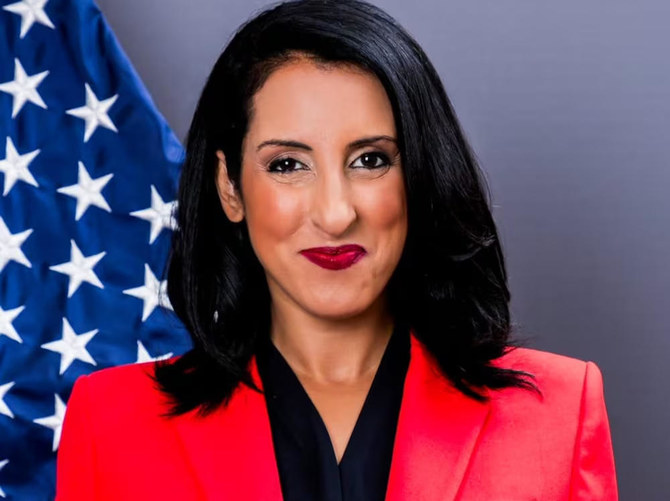
- Hala Rharrit is at least the third person to resign from the department over the issue
WASHINGTON: The Arabic language spokesperson of the US State Department has resigned, citing her opposition to Washington’s policy related to the war in Gaza, in at least the third resignation from the department over the issue.
Hala Rharrit was also the Dubai Regional Media Hub’s deputy director and joined the State Department almost two decades ago as a political and human rights officer, the department’s website showed.
“I resigned April 2024 after 18 years of distinguished service in opposition to the United States’ Gaza policy,” she wrote on social media website LinkedIn. A State Department spokesperson, asked about the resignation in Thursday’s press briefing, said the department has channels for its workforce to share views when it disagrees with government policies.
Nearly a month earlier, Annelle Sheline of the State Department’s human rights bureau announced her resignation, and State Department official Josh Paul resigned in October.
A senior official in the US Education Department, Tariq Habash, who is Palestinian-American, had stepped down in January.
The United States has come under mounting criticism internationally and from human rights groups over its support for Israel amid Israel’s ongoing assault in Gaza that has killed tens of thousands and caused a humanitarian crisis.
There have been reports of signs of dissent in the administration of President Joe Biden as deaths continue to grow in the war.
In November, more than 1,000 officials in the US Agency for International Development (USAID), part of the State Department, signed an open letter calling for an immediate ceasefire. Cables criticizing the administration’s policy have also been filed with the State Department’s internal “dissent channel.”
The war has also caused intense discourse and anti-war demonstrations across the United States, Israel’s most important ally.
Palestinian Islamist group Hamas attacked Israel on Oct. 7, killing 1,200 people, according to Israeli tallies. Israel has killed over 34,000 people in Hamas-governed Gaza, according to Gaza’s health ministry, leading to widespread displacement, hunger and genocide allegations that Israel denies.
Burkina Faso suspends BBC, VOA radio broadcasts over killings coverage
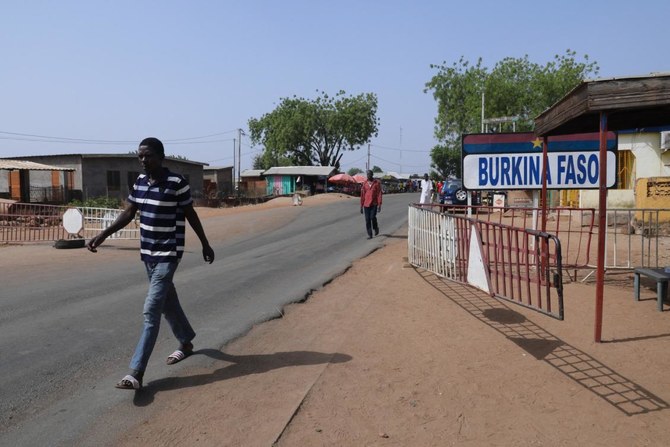
- Authorities handed two-week suspension for covering of report accusing the army of extrajudicial killings
- Human Rights Watch report says military executed about 223 villagers, including at least 56 children
LONDON: Burkina Faso has suspended the radio broadcasts of BBC Africa and the US-funded Voice of America (VOA) for two weeks over their coverage of a Human Rights Watch (HRW) report accusing the army of extrajudicial killings, authorities said late on Thursday.
In the report based on its own investigation, the rights watchdog said the West African country’s military summarily executed about 223 villagers, including at least 56 children, in February as part of a campaign against civilians accused of collaborating with jihadist militants.
HRW said the Burkinabe army has repeatedly committed mass atrocities against civilians in the name of fighting terrorism, and it called on authorities to investigate the massacres.
The country’s communication council said HRW’s report contained “peremptory and tendentious” declarations against the army likely to create public disorder and it would suspend the programs of the broadcasters over their coverage of the story.
Authorities also said in a statement they had ordered Internet service providers to suspend access to the websites and other digital platforms of the BBC, VOA and Human Rights Watch from Burkina Faso.
“VOA stands by its reporting about Burkina Faso and intends to continue to fully and fairly cover events in that country,” Acting VOA Director John Lippman said in a statement.
“The Voice of America strictly adheres to the principles of accurate, balanced and comprehensive journalism, therefore, we ask the government of Burkina Faso to reconsider this troubling decision.”
HRW conducted its investigation after a regional prosecutor said in March that about 170 people were executed by unidentified assailants during attacks on the villages of Komsilga, Nodin and Soro.
Burkina Faso is one of several Sahel nations that have been struggling to contain Islamist insurgencies linked to Al-Qaeda and Islamic State that have spread from neighboring Mali since 2012, killing thousands and displacing millions.
Frustrations over authorities’ failure to protect civilians have contributed to two coups in Mali, two in Burkina Faso and one in Niger since 2020.
Russia arrests Forbes reporter over Bucha posts
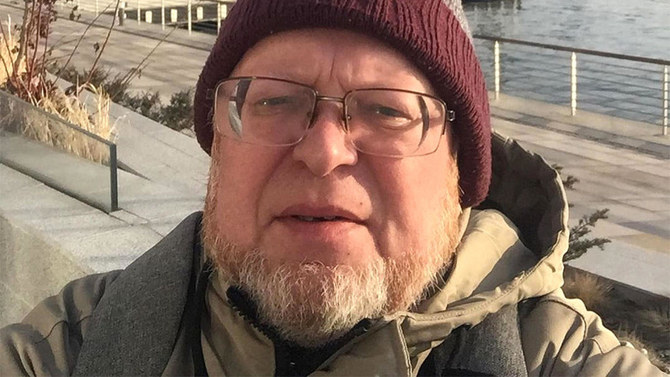
- Sergei Mingazov was detained with the accusation of spreading false information about the army
MOSCOW: Russia has arrested a journalist from the Russian edition of Forbes magazine for social media reposts over accusations of Russian atrocities in the Ukrainian town of Bucha, his lawyer and Forbes said on Friday.
Rights groups say hundreds of Russians have been arrested, fined and jailed for criticizing Russia’s offensive on Ukraine under tough military censorship laws.
Russian authorities have particularly targeted people for comments on Bucha, the Kyiv suburb where Russian troops have been accused of massacring civilians.
Moscow has rejected those charges and accused Kyiv and the West of staging the scenes of dead civilians and testimonies of torture.
“Sergei Mingazov was detained and is being held in a temporary detention center” in the Far East city of Khabarovsk, the journalist’s lawyer Konstantin Bubon said in a Facebook post.
He faces up to 10 years in prison under charges of spreading “false information,” Bubon said.
“In short, for reposting a publication about the events in Bucha” on a Telegram channel, he added.
His Telegram channel, which has around 430 followers, features a number of reposts from April 2022 that allege Russian troops killed civilians in Bucha.
Russian forces controlled the Kyiv suburb for a month at the start of the campaign.
Pictures of dead civilians found on the streets made front pages around the world, triggering outrage in the West.
Forbes Russia said Friday it had not been able to contact Mingazov.
A Russian reporter was last month sentenced to seven years in jail for articles on alleged Russian war crimes, including at Bucha.
And opposition politician Ilya Yashin is serving eight and a half years in jail on similar charges after discussing the claims in a YouTube video.
Moscow has outlawed criticism of its offensive and has made independent reporting on the campaign effectively illegal.
Numerous foreign and Russian reporters have left the country over the last two years under the fear of arrest.
The Reporters Without Borders advocacy group said Russia arrested 34 journalists during 2023.
They included Wall Street Journal reporter Evan Gershkovich, a US citizen, and joint US-Russian citizen Alsu Kurmasheva — both of whom are still in pre-trial detention.
Saudi Vision 2030 changed everything, says CEO of Publicis Communications KSA

- Adel Baraja brought over 2 decades of global experience
- Role includes overseeing the group’s Saudi operations, fostering talent
DUBAI: Advertising and marketing network Publicis Groupe appointed Adel Baraja as CEO of Publicis Communications Saudi Arabia in late February as part of its efforts to strengthen its presence in the Kingdom.
Publicis Communications is the creative communications arm of the network housing agencies such as Leo Burnett and Saatchi & Saatchi.
The appointment reinforced Publicis Groupe Middle East’s commitment to accelerating growth within Saudi Arabia while enhancing collaboration and expanding capabilities to deliver transformative work for clients.
 Baraja brought with him 22 years of global advertising and brand-building experience.
Baraja brought with him 22 years of global advertising and brand-building experience.
He had started his professional life in engineering before realizing it was not for him.
He told Arab News: “I wanted to be with clients and that’s when I took my first pivot toward client management (and) sales, and I found my calling in marketing.”
He spent his early days working across advertising agencies in Germany, Spain, and Portugal, before returning to Saudi Arabia where he first interacted with Publicis Groupe. At the time he was hoping to find a job at Leo Burnett, but turned out to be a better fit for one of its clients, Saudi Telecom Company.
He then took a break from advertising agencies to work across industries in companies like Dow Chemical and Volkswagen.
And then, he said, came a “critical moment” in his career.
He added: “I never considered (working in) government before, but six months prior Vision 2030 was introduced, and that was everything.
“It was a meticulous plan — a road map towards something that I had never experienced or seen before. So, I got my first role in government in 2017.”
He led the newly established promotion and nation-branding sector at the Saudi Export Development Authority, growing the Saudi Made portfolio of companies from 20 to more than 2,000 companies during his tenure.
He also held the position of deputy minister of investment promotion at the Ministry of Investment before joining Publicis Groupe Middle East.
Communications had always been a “savvy topic” in the Kingdom, but it was heavily focused on and driven by the private sector, he said.
Vision 2030 changed it all, and “the government sector became a big spender in the communication sector and a driver to creativity,” he added.
With these changes, the demand for local talent is higher now than ever before, and fostering that talent is a strong priority for Baraja and Publicis Groupe.
Baraja is tasked with overseeing the integrated growth strategy of Publicis Communications in his new role, as well as working with educational institutions to empower Saudi youth for careers in advertising, media, and digital marketing.
He said that Bassel Kakish, CEO at Publicis Groupe Middle East and Turkiye, told him that the company needs to be developing and fostering local talent, hiring more locally, and ensuring gender equality, training more women in the advertising and creative industries.
Baraja said: “We are competing against other industries to get that share of talent, so we need to promote our industry and our company.”
Looking ahead, the company is investing in the future, which means increased focus on technology through acquisitions such as that of tech company Epsilon in 2020 and e-commerce company Corra in 2023.
Publicis last year announced the acquisition of a full stake in Publicis Sapient AI Labs, an artificial intelligence research and development joint venture launched in 2020 which aims to strengthen Publicis Sapient’s data and AI capabilities.
Baraja added: “That kind of investment shows the focus toward the future and the transformation of the business.”
There is a lot of discussion around AI replacing marketing and agencies, he said, but he believes: “We are well equipped to address this challenge and to prove that we can deliver even better communications, and better and well-designed campaigns and media performances.”



